In the early days of his presidency, Ebrahim Raisi outlined two main priorities in Iranian foreign policy: improving relations with neighbors, and expanding ties with Asian powers, including China and Russia. “I extend a hand of friendship and brotherhood to all countries in the region, especially neighbors,” Raisi said during his inauguration speech on August 5. “Iran’s power in the region creates security.” Iran’s policy is aimed at countering the influence of countries outside the region. “Foreign intervention in this region resolves no problem; it’s a problem itself.”
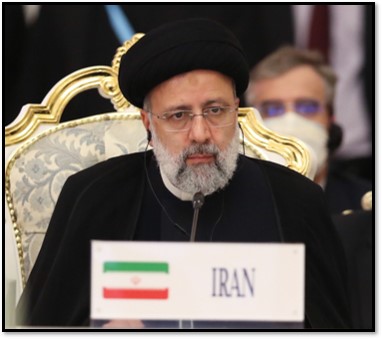
In his first address to the U.N. General Assembly on September 21, he said that foreign intervention, notably by the United States, had produced only conflict and political discord. “What is seen in our region today proves that not only the hegemonist and the idea of hegemony, but also the project of imposing Westernized identity have failed miserably,” he said. “The result of seeking hegemony has been blood-spilling and instability and, ultimately, defeat and escape. Today, the U.S. does not get to exit Iraq and Afghanistan but is expelled. And, at the same time, it is the oppressed people, from Palestine and Syria to Yemen and Afghanistan, as well as the U.S. taxpayers, who have to pay for this lack of rationality.”
Raisi’s choice for foreign minister, Hossein Amir-Abdollahian, reflected his goals. The career diplomat has had extensive experience in Arab-majority countries and speaks Arabic in addition to English. Amir-Abdollahian’s first posting was in 1997 to Iran’s embassy in Baghdad. He later headed a special department in the foreign ministry for Iraq. Amir-Abdollahian served as ambassador to Bahrain from 2007 to 2010 and then as deputy foreign minister for Arab and African affairs from 2011 to 2016.
Amir-Abdollahian has emphasized expanding Iran’s trade and bilateral ties with Asia. “The 21st century belongs to Asia where we see emerging economic powers,” he told Parliament during his confirmation hearing on August 22. “Neighbor-centered and Asia-centered policy is the main priority,” he added. In February, before his appointment, Amir-Abdollahian had highlighted “untapped capacities in Asian countries such as Russia, China, India, Malaysia, Indonesia and subcontinental countries.”
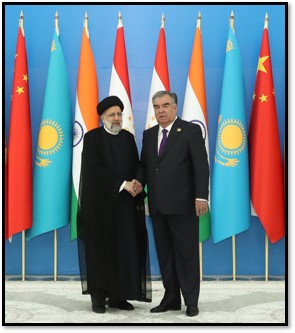
In another sign of Iran’s pivot to the East, Raisi’s first trip abroad as president was to the summit of the Shanghai Cooperation Organization (SCO) in Dushanbe, Tajikistan on September 16-17. The SCO, founded in 2001, focuses on regional economic and security issues. The bloc, led by China and Russia, includes India, Kazakhstan, Kyrgyzstan, Pakistan, Tajikistan, and Uzbekistan. Iran gained observer status in 2005. In 2021, the SCO began the process to formally admit Iran as a full member at the Dushanbe summit.
In contrast, Raisi has done little outreach to Western powers except for his hour-long phone call with French President Emmanuel Macron on August 9. In his first press conference as president-elect, Raisi warned that his administration would take a tougher stand on diplomacy with the international community. “The world, particularly the West, should realize that the situation in Iran has changed through the people’s vote,” Raisi told reporters on June 21. The following is a breakdown of Raisi’s early comments or actions on foreign policy.
The Baghdad Summit
The new government’s first major foreign engagement was a regional conference in Iraq on August 28 that also included the presidents, kings or foreign ministers from Egypt, Jordan, Kuwait, Qatar, Saudi Arabia, Turkey, and the United Arab Emirates; French President Emmanuel Macron also participated. The goal was to ease regional tensions, particularly between Iran and the Arab nations. Iran, which is predominantly Persian, is one of only two countries in the Middle East that is not ruled by Arabs. It was Amir-Abdollahian’s first trip abroad as foreign minister.
Speaking in Arabic, Amir-Abdollahian emphasized Iran’s intention to improve ties with regional states. He blamed unrest on foreign intervention. “Security will only be achieved through mutual trust, reliance on national capabilities, strengthening relations and good neighborliness as well as through the non-intervention of extra-regional governments,” he said. He expressed regret that Syria had not been invited to the conference.
On the sidelines, Amir-Abdollahian met representatives from six regional countries:
- Egypt: President Abdel Fattah el Sissi
- Iraq: Prime Minister Mustafa al Kadhimi and President Barham Salih
- Kuwait: Foreign Minister Ahmed Nasser al Mohammed al Sabah
- Saudi Arabia: Foreign Minister Faisal bin Farhan al Saud
- Turkey: Foreign Minister Mevlüt Çavuşoğlu
- UAE: Prime Minister Mohammed bin Rashid al Maktoum
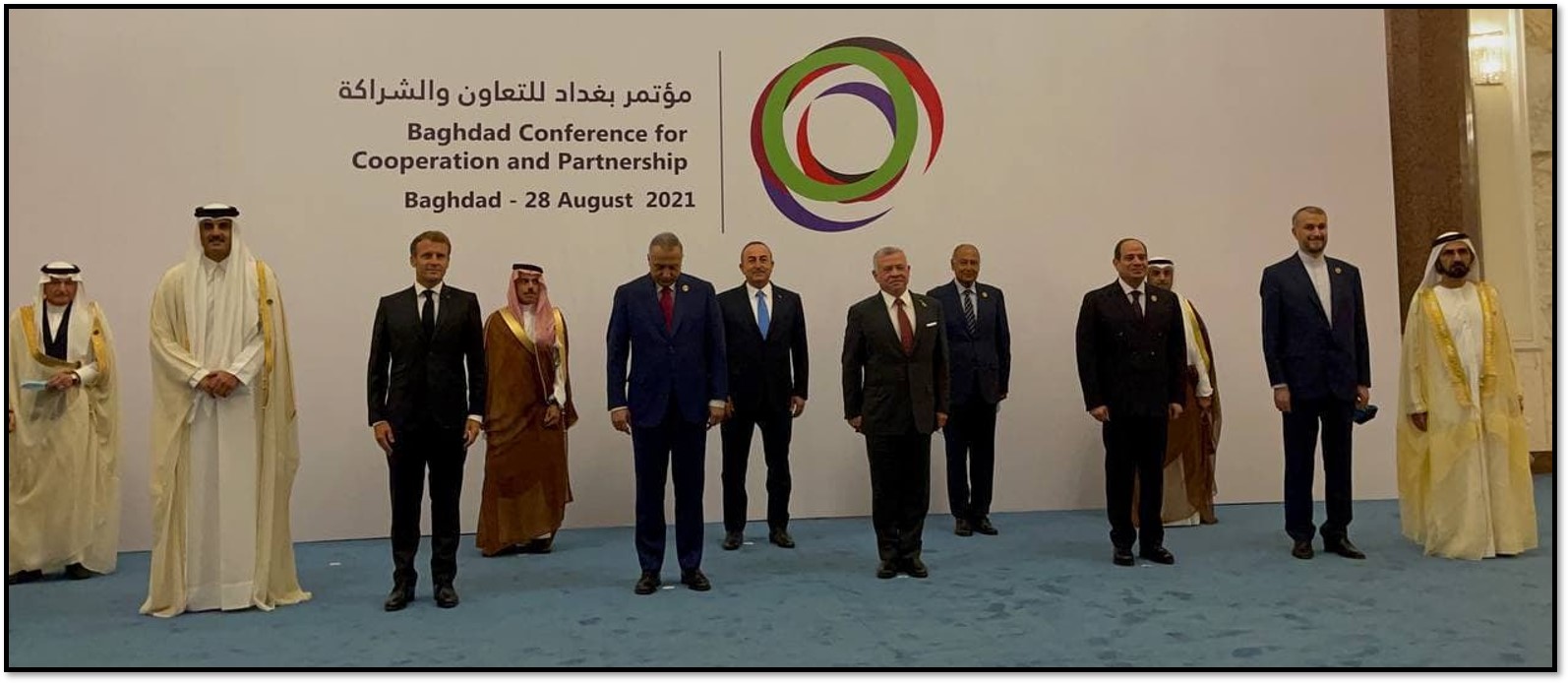
Amir-Abdollahian created a flap when he refused to stand in the assigned spot in a group photo. He positioned himself in the front row with leaders rather than in the second row with other lower-level ministers. “I believe I stood in the spot that is the true position of the Islamic Republic and its representative,” he said in an interview after returning to Iran.
Syria
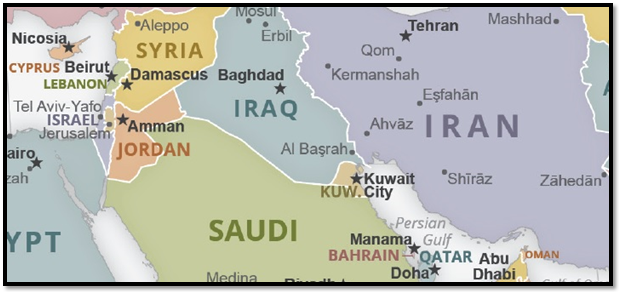 On August 29, after the Baghdad conference, Amir-Abdollahian flew to Damascus, where he met President Bashar al Assad. They discussed how to deepen economic partnerships in the face of sanctions and other regional flashpoints, including the rippling impact of the Taliban takeover of Afghanistan. Amir-Abdollahian said that Tehran and Damascus would “together take mighty steps to confront economic terrorism and reduce pressure on our people,” a reference to U.S. sanctions on both countries.
On August 29, after the Baghdad conference, Amir-Abdollahian flew to Damascus, where he met President Bashar al Assad. They discussed how to deepen economic partnerships in the face of sanctions and other regional flashpoints, including the rippling impact of the Taliban takeover of Afghanistan. Amir-Abdollahian said that Tehran and Damascus would “together take mighty steps to confront economic terrorism and reduce pressure on our people,” a reference to U.S. sanctions on both countries.
Syria has been Iran’s only Arab ally since the 1979 revolution. Iran has provided critical military and economic support—including oil shipments—to the Assad regime, especially since the Syrian civil war broke out in 2011.
Iraq
On September 12, Raisi welcomed Prime Minister Mustafa al Kadhimi, who was the first foreign leader to visit Tehran since Raisi took office. The invitation to Kadhimi reflected Raisi’s focus on neighboring states. “The deep bonds between Tehran and Baghdad stems from the beliefs and hearts of two nations, two countries and two governments,” Raisi said at a joint press conference. Iran has sought to have influence in Iraq since former President Saddam Hussein’s invasion in 1980 led to an eight-year war that killed hundreds of thousands.
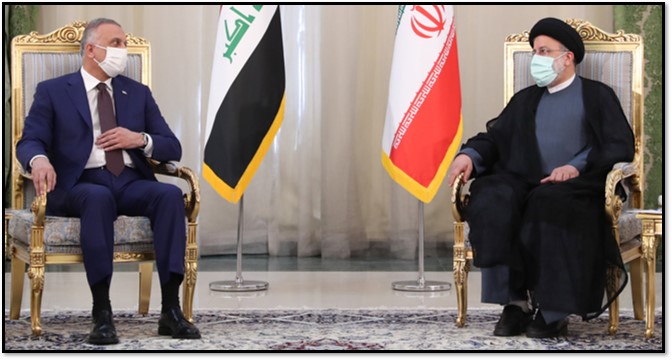
The leaders discussed trade, energy, counterterrorism, pilgrimages, and transportation across their 900-mile border. Iraq depends on Iran for about a third of its energy needs. “Iraq needs Iran’s gas and electricity, and we declare that the doors of Iraq are open to the Iranian companies,” Kadhimi said on September 12. Iraq’s overdue payments for Iranian gas and electricity have been a contentious issue; As of December 2020, Iraq owed Iran $6 billion just for gas. Iran then cut supplies to Iraq. In August 2021, Iranian gas supplies to central Iraq had dropped from 3 million to 2 million cubic meters per day. Supplies to the southern Iraq were down from 17 million to 5 million cubic meters per day, according to Iraq’s electricity ministry.
Tehran and Baghdad have also collaborated in the campaign to defeat ISIS, which seized a third of Iraqi territory between 2014 and 2017 and came within 25 miles of the Iranian border. “The Islamic Republic of Iran stood by the Iraqi people from the very beginning to fight ISIS terrorists, and the Iraqi people will always be grateful for this support,” Kadhimi said in Tehran.
Raisi and Kadhimi also addressed tensions over the Iranian Kurdish opposition groups based in northern Iraqi Kurdistan. Ali Shamkhani, the secretary of Iran’s Supreme National Security Council, urged Kadhimi to disarm and expel the militant groups. Iran considers the Party of Free Life of Kurdistan (PJAK), the Democratic Party of Iranian Kurdistan (PDKI), and others as terrorist groups.
Since the 1980s, Iranian Kurds in northern Iraq have launched sporadic cross border attacks. On September 9, Iran attacked Kurdish militants in Iraq with artillery and drones after clashes along the border.
Iran and Iraq are Shiite-majority countries that share cultural and religious ties dating back centuries. Since the 2003 toppling of Saddam Hussein, who led a Sunni-dominated regime, Tehran has tried to permeate Iraq’s political, security, economic, and religious spheres.
Saudi Arabia
Raisi signaled his intent to improve ties with rival Saudi Arabia after he was elected. “I say that there is no obstacle to having a dialogue with Saudi Arabia and relations with all countries. We are ready to reopen embassies,” he said on June 21. The two countries severed diplomatic relations in 2016 after Saudi Arabia executed Nimr al Nimr, a popular Shiite cleric, and Iranian protesters set fire to the Saudi embassy in Tehran in retaliation.
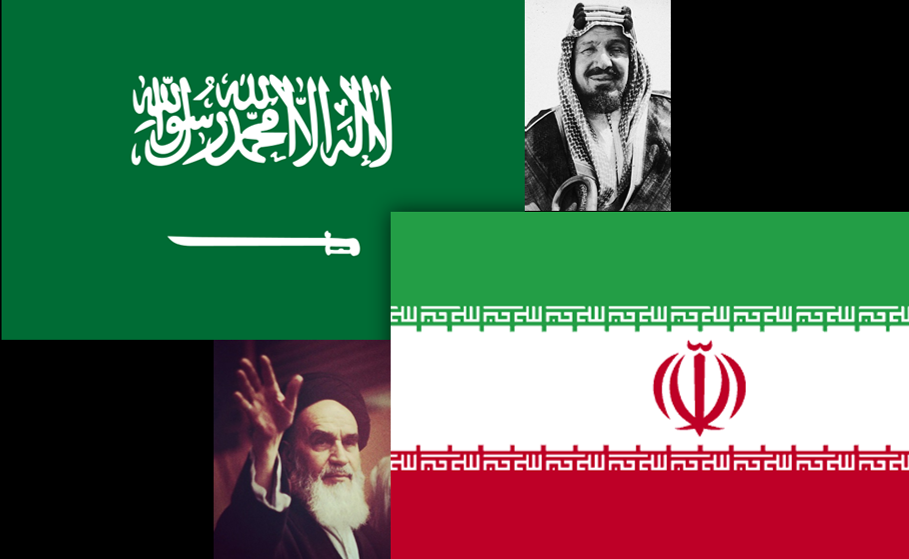 Before Raisi took office, Iran and Saudi Arabia held three rounds of talks in Baghdad between April and July 2021. Prime Minister Kadhimi mediated the talks. Riyadh reportedly declined an invitation to attend Raisi’s inauguration on August 5. But Foreign Minister Amir-Abdollahian met his Saudi counterpart Faisal al Saud on the sidelines of the Baghdad summit on August 28 to discuss resuming talks. On August 31, Iran confirmed that it would continue the dialogue. “We have had three rounds of negotiations with the Saudi side, and the fourth round is to be held after the formation of a new Iranian government,” Iran’s ambassador to Iraq said.
Before Raisi took office, Iran and Saudi Arabia held three rounds of talks in Baghdad between April and July 2021. Prime Minister Kadhimi mediated the talks. Riyadh reportedly declined an invitation to attend Raisi’s inauguration on August 5. But Foreign Minister Amir-Abdollahian met his Saudi counterpart Faisal al Saud on the sidelines of the Baghdad summit on August 28 to discuss resuming talks. On August 31, Iran confirmed that it would continue the dialogue. “We have had three rounds of negotiations with the Saudi side, and the fourth round is to be held after the formation of a new Iranian government,” Iran’s ambassador to Iraq said.
Iran and Saudi Arabia have been at odds since Iran’s 1979 revolution, which ended 2,500 years of dynastic rule. Both countries apply Islamic law, known as Sharia. But Iran is predominantly Shiite, while Saudi Arabia is mainly Sunni. And the Islamic Republic has long condemned monarchies as an illegitimate form of government. Since 2011, political tensions have increased over regional conflicts, particularly in Syria and Yemen. They have also competed for shares of the international oil market, sometimes differing over price and quotas.
Afghanistan
Raisi took office on August 5, as the Taliban made gains across Afghanistan. On August 16, he hailed the imminent U.S. withdrawal on August 30 as “an opportunity to restore life, security and durable peace.” Raisi also urged Afghans to stop fighting. “Iran backs efforts to restore stability in Afghanistan and, as a neighboring and brother nation, Iran invites all groups in Afghanistan to reach a national agreement,” he said.
Virtually met FMs of 6 neighbors of Afghanistan.
— H.Amirabdollahian امیرعبداللهیان (@Amirabdolahian) September 8, 2021
Emphasized on security, stability & development by formation of an inclusive gov reflecting diversity & will of Afghan ppl; dialogue instead of violence; rejection of foreign intervention.
We support intra-Afghan talks & agreements pic.twitter.com/6Ef2AJ3mqo
Raisi called on the Taliban to hold elections. “We support a government that is based on the will of the people of Afghanistan, and this is a requirement of the foreign policy of the Islamic Republic,” he said on national television on September 4.
Iranian officials initially refrained from criticizing the Taliban, but the tone shifted after Afghanistan’s new government was announced on September 7. The appointed officials, all men, were almost exclusively Pashtun, the largest ethnic group. “It is certainly not the inclusive government that the international community and the Islamic Republic of Iran expect,” the spokesman for the foreign ministry, Saeed Khatibzadeh, said on September 13. Iran has long cultivated ties with minorities in Afghanistan, including the Persian-speaking Tajiks and Hazaras.
Iran also condemned the Taliban assault on Afghan opposition forces in the Panjshir Valley. “The recent unjustifiable attack and condemnable fratricide in Panjshir is in contradiction with the united position of the international community,” Iran’s U.N. ambassador, Majid Takht Ravanchi, told the Security Council on September 9.
Iran has a strategic interest in Afghanistan, with which it shares a 572-mile border. The chaotic aftermath of the Taliban’s takeover threatened Tehran’s long-term interests, including migrants and refugees, narcotics trafficking, cross-border trade, water resources, the Shiite minority, and the threat from ISIS-Khorasan.
The Palestinians
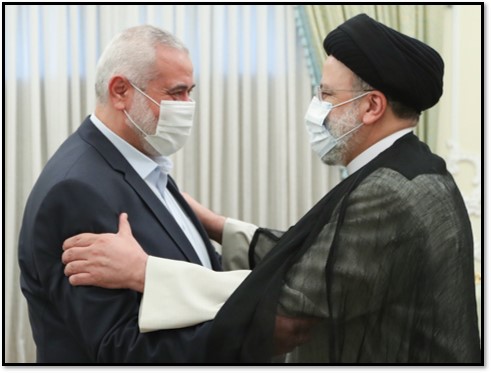
Raisi signaled his support for the Palestinians by inviting the leaders of three militant groups—Hamas, Palestinian Islamic Jihad (PIJ) and the PFLP-GC—to his August inauguration. He met each leader separately during his first full day in office. Since the 1980s, Iran has provided funding, weapons and training to Palestinian militants.
“Today, the Zionist regime [Israel] is more helpless, and the power of resistance is greater than ever,” Raisi told Talal Naji, the PFLP-GC secretary general. “The enemies are very worried that the great people of Iran have chosen you,” Naji said. Raisi alsomet Ismail Haniyeh, the Hamas politburo chief, and Ziyad al Nakhalah, the PIJ secretary general.
During his visit to Damascus on August 29, Amir-Abdollahian met representatives from PIJ, the PFLP-GC, PIJ, the DFLP, and the breakaway Abu Musa faction of Fatah. The foreign minister pledged Iran’s continued support.
China
Raisi has prioritized expanding ties with China, Iran’s largest trade partner. He highlighted “great potential for cooperation” with Beijing in his first press conference as president elect. “Implementing the comprehensive partnership will definitely be on the agenda,” he said on June 21. In March, the two countries signed a 25-year plan to deepen economic, security and political relations.
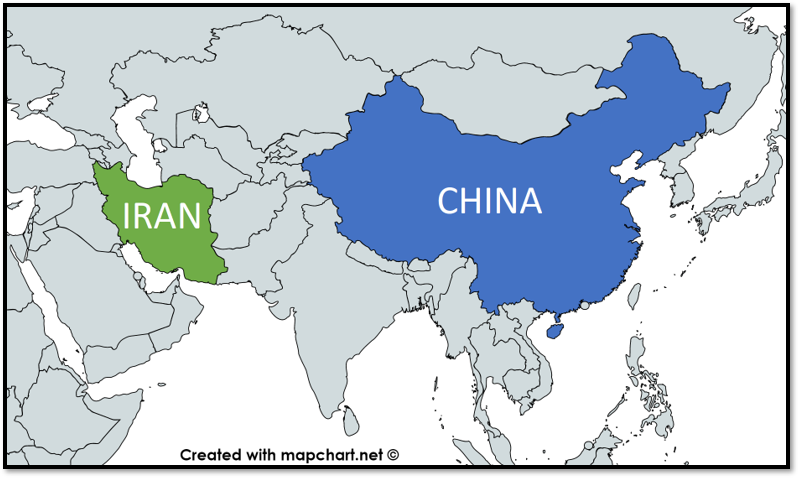 “Promoting cooperation with China is one of the top priorities of the Iranian government,” Raisi told President Xi Jinping during a call on August 18. Xi pledged to continue delivering COVID-19 vaccines to Iran. He also lauded the “remarkable results and achievements” from bilateral ties. The two countries celebrated the 50th anniversary of the establishment of diplomatic relations in August 2021.
“Promoting cooperation with China is one of the top priorities of the Iranian government,” Raisi told President Xi Jinping during a call on August 18. Xi pledged to continue delivering COVID-19 vaccines to Iran. He also lauded the “remarkable results and achievements” from bilateral ties. The two countries celebrated the 50th anniversary of the establishment of diplomatic relations in August 2021.
On October 3, Raisi sent a congratulatory message to Xi on the 72nd anniversary of the founding of the People's Republic of China. The following is an excerpt:
I would like to offer my sincerest congratulations to Your Excellency and the great nation of China on the National Day and the 72nd anniversary of the Establishment of the People's Republic of China.
China's glorious achievements in recent decades have been due to the unity and solidarity of its great nation and wise leaders such as Your Excellency for national growth and development.
China's sustained commitment to the priority of "development" on the global political agenda reflects China's vision of a just, people-oriented international order that benefits all countries, especially developing ones.
Iran and China, as two great peace-loving civilizations and comprehensive strategic partners, can provide the ground for the realization of true multilateralism through strategic cooperation and win-win cooperation. Certainly, lasting trust between the two countries can expand the context of cooperation in the form of the One Road-One Belt Initiative, as well as a comprehensive program of cooperation, and turn inter-regional cooperation into development, stability and peace.
I hope that in the new chapter of relations between the two countries, we will see the promotion and expansion of cooperation in various economic, political and cultural fields, as well as the implementation of strategic partnership.
Iran and China share a common goal of countering U.S. influence in the Middle East and South Asia. But commerce forms the backbone of their relationship. China, which has been buying Iranian oil since 1974, has long been an important trade partner. China overtook the European Union as Iran’s largest trading partner after bilateral trade soared to $36.5 billion, up from $14.4 billion just three years before. Iran has become increasingly reliant on trade with China since the United States withdrew from the 2015 nuclear deal and reimposed sanctions on the Islamic Republic in 2018. Iran has reportedly used third party intermediaries in Oman, Malaysia and the United Arab Emirates to mask oil exports to China.
Russia
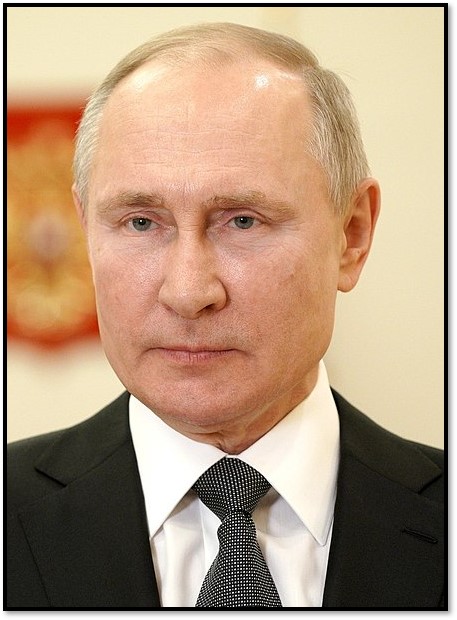
Raisi has expressed eagerness to boost ties, especially on trade, with Russia. After Raisi won the presidential election on June 19, President Vladimir Putin was the first foreign leader to congratulate him. Putin expressed hope that the two countries could expand cooperation during Raisi’s presidency.
During a call with Putin on August 18, Raisi said that Iran was determined to finalize a 20-year cooperation agreement that had been in the works since 2020. Putin welcomed the initiative. He also pledged to “accelerate” the delivery of COVID-19 vaccines to Iran. In a second call, on September 14, Raisi and Putin discussed collaborative efforts to fight the COVID-19 pandemic, including the joint production of Russia’s Sputnik vaccine.
Russia and Iran have had a rocky relationship since the early 19th century, when Iran lost territory to the Russian Empire. But the two countries have expanded political, economic and military cooperation since the Soviet Union dissolved in 1991. They both oppose the U.S.-led world order, support the Assad regime in Syria, and see Sunni jihadist movements, such as ISIS, as serious threats. Russia and Iran signed their first cooperation treaty in 2001. It has subsequently been renewed, as recently as March 2021, for five years. But the new pact was expected to be more extensive.
The United States and Europe
In his first press conference as president elect, Raisi accused the United States and European powers of not complying with the 2015 nuclear deal, known formally as the Joint Comprehensive Plan of Action (JCPOA). “The JCPOA has been violated by the United States and the Europeans have also not abided by their commitments,” he said on June 21.
Raisi also rejected potential negotiations to limit either Iran’s regional role or its ambitious missile program, key issues of concern for Western powers. And he ruled out a meeting with President Joe Biden even if Iran and the United States agreed on a path to return to mutual compliance with the JCPOA.
HR/VP @JosepBorrellF met with Foreign Minister of Iran @Amirabdolahian this Tuesday, 21/09, in the margins of #UNGA. They have discussed the #JCPOA, bilateral cooperation between the 🇪🇺 EU and 🇮🇷 Iran and the challenges of the new situation in Afghanistan. https://t.co/pSaPEHvOsA pic.twitter.com/UDbbQxRR6X
— European External Action Service - EEAS 🇪🇺 (@eu_eeas) September 22, 2021
Raisi has since done little public outreach to European powers. Enrique Mora, the E.U. coordinator of talks on restoring the 2015 nuclear deal, attended Raisi’s inauguration on August 5 and met Amir-Abdollahian before he was nominated as foreign minister.
On August 9, Raisi spoke with French President Emmanuel Macron for an hour. It was reportedly his first call with a Western official. Raisi again criticized the European parties to the nuclear deal—Britain, France and Germany—for allegedly failing to fulfil their obligations under the agreement. Macron, in turn, urged Iran to quickly return to talks in Vienna that had stalled in June. But the two leaders agreed on the need to deepen bilateral ties.
In his U.N. address, Raisi had the sharpest words for the United States. “This year, two scenes made history: one was on January the 6th when the U.S. congress was attacked by the people and, two, when the people of Afghanistan were dropped down from the U.S. planes in August,” Raisi told the world body in a prerecorded message on September 21. “From the Capitol to Kabul, one clear message was sent to the world: the U.S.’ hegemonic system has no credibility, whether inside or outside the country.” Foreign Minister Amir-Abdollahian attended the U.N. General Assembly in person. He met several European ministers and the E.U. foreign policy chief during his visit to New York City.
Nuclear Talks
Raisi has expressed support for the JCPOA and efforts to restore full U.S. and Iranian compliance. Six rounds of talks, between March and June, were suspended during Iran’s presidential campaign. On June 21, in his first press conference as president-elect, he committed to diplomacy that was in Iran’s national interests. But he warned, “We will not allow talks for the sake of talks.” Raisi also emphasized that Iran’s foreign policy agenda would not be driven or restricted by the JCPOA.
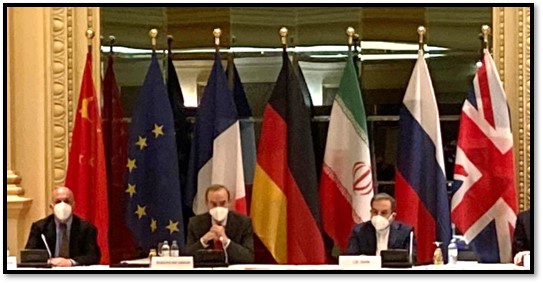
On August 31, Foreign Minister Amir-Abdollahian assured the public that Iran would eventually return to talks. “We are not seeking to flee the negotiation table and the… government considers a real negotiation is a negotiation that produces palpable results allowing the rights of the Iranian nation to be guaranteed,” he said in a televised interview. “The other party knows full well that a process of two to three months is required for the new government to establish itself and to start taking decisions.”
On September 22, Amir-Abdollahian met E.U. foreign policy chief Josep Borrell on the sidelines of the U.N. General Assembly in New York City. Borrell said that Amir-Abdollahian assured him of Iran’s “willingness to resume negotiations at an early date.”
Garrett Nada is the managing editor of The Iran Primer at the U.S. Institute of Peace.
Photo Credits: Raisi via President.ir; Baghdad summit via Iranian Ministry of Foreign Affairs; Assad from Kremlin.ru, CC BY 4.0, via Wikimedia Commons; Putin by Kremlin.ru, CC BY 4.0, via Wikimedia Commons; Raisi via Tasnim News Agency (CC BY 4.0)
